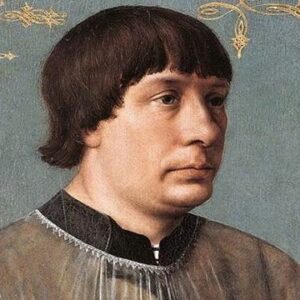Jacob Obrecht was a Franco-Flemish Renaissance composer who was well-known throughout Europe during his lifetime. However, soon after his death, one of his contemporaries, Josquin des Prez, surpassed his fame. Obrecht’s collection of work includes 30 mass settings as well as motets for three and four voice parts. Vertical chords were frequently used in his writing style. His work differed from Josquin’s in that it rarely followed a single motivic pattern across a piece, and therefore his counterpoint lacked a long-range function. Full and sonorous writing, parallel 10ths between outer voices, and an excellent use of canon while preserving a concentration on root-position chords are all significant features of his work. Obrecht worked in Flemish cities for the majority of his career. He was appointed as a composer in Italy by the duke, and despite the fact that he was unemployed following the duke’s death, he remained there until he died of plague.
Childhood and Adolescence
Jacob Obrecht is only known because of his motet Mille quingentis, a lament written for his father’s death, which reveals he was born on St. Cecilia’s Day, 1450, in either Bergen op Zoom or Sicily. According to certain documents, Obrecht spent the majority of his boyhood in the Netherlands, where he also appears to have obtained his education.
However, there isn’t much that can be said about his education with certainty. According to some evidence, he possibly learned to play the trumpet from his father, Willem Obrecht, a Ghent municipal trumpeter. Though the details of his education are sketchy, it is clear that he attended university and was ordained as a priest by 1480. His mother, Lijsbette Gheeraerts, died at the age of 20 in 1460, while his father died in Ghent in 1488.
Career of Jacob Obrecht
The early years of Obrecht’s career are also mostly unknown. However, some unclear evidence suggests that he may have been in Florence and Ferrara in early 1474. Obrecht held various roles in Bergen op Zoom between 1479 and 1480. He was thereafter chosen as the chapel master in Cambrai in 1484. Obrecht was appointed succentor of St-Donatien in Bruges in November 1485. He was granted permission to visit the Duke of Ferrara, Ercole I d’Este, at Ferrara, Italy, two years later, in 1487.
Ercole offered a benefice to entice the composer to stay in Ferrara, but Obrecht declined. The Duke was known to be a major fan of Obrecht’s work and thought it was superior to all others. Obrecht was well-known in the Low Countries for the majority of his career, but by the 1480s, he was also well-known in Italy. Obrecht thereafter went back to Bruges, where he stayed until 1491.
From 1494 to 1496, his name appears in the records of the Church of Our Lady in Antwerp, and again, from 1501 until 1503. In 1491, 1498, and 1500, he paid visits to Bruges. In 1496 and 1498, he paid visits to Bergen op Zoom. On the request of Duke Ercole I d’Este of Ferrara, he returned to Ferrara in 1504 to serve as a composer at the D’Este chapel.
However, the Duke died early the next year, leaving Obrecht jobless. Obrecht, on the other hand, stayed in Ferrara until his death in 1505, but his work situation is unknown. Several of Obrecht’s paintings were printed by Ottavio Petrucci of Venice during his lifetime. Ottavio Petrucci issued a book of five Masses by Obrecht in 1503 in addition to a collection of his secular compositions and motets.
Death and Enduring Legacy
In Ferrara, in 1505, Obrecht perished of the plague. Obrecht became known as one of the “ancients” (antichi) and as one of the first to make music after his death a decade later. This could have occurred as a result of various key shifts in musical styles throughout the first decades of the 16th century.
Major works of Jacob Obrecht
Missa Sub tuum presidium
Missa Maria zart
Mille quingentis
Estimated net worth
The estimated net worth of Jacob Obrecht is unknown.


